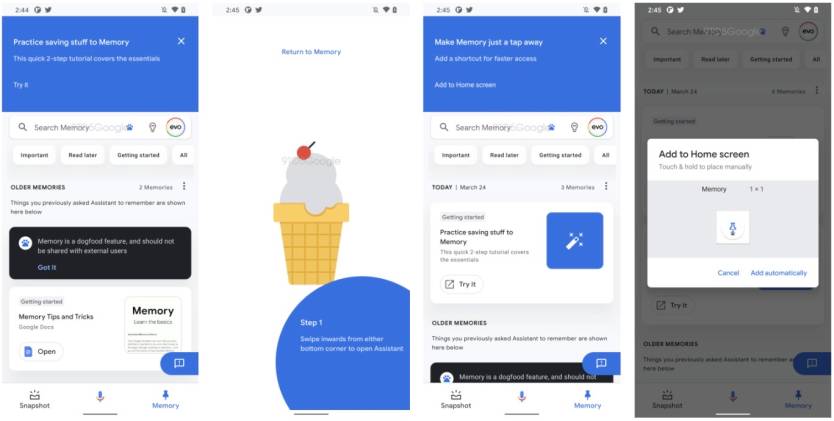There’s no question that Google Assistant is one of the main advantages Android has over iPhone. The voice assistant also comes in handy on smart speakers, leveraging Google’s advanced voice-based computing power. The virtual assistant gets new features continuously, and Google is already working on a significant upgrade that could be unveiled soon. Google Assistant will include a new Memory feature that will let users save anything they think they’ll need to remember down the road. The feature is a massive upgrade over setting reminders or tracking packages and travel information with the Assistant. The app will now let you save on your phone practically anything you need to remember with simple voice commands and a new user interface. You’ll be able to retrieve the content later, complete with contextual information.
The information comes from an application teardown that already includes code and language, hinting at the future Memory feature and the revamped user interface. As 9to5Google points out, the feature indicates that Google wants the Assistant to take advantage of the phone form factor, rather than being just a voice app that works without requiring any sort of screen interface or interaction.
According to the language that Google uses, the Memory feature is an “easy, quick way to save and find everything in one place.” Here are some of the examples that Google offers in the Assistant app about what you can save to Memory:
- Save any screen content to Memory: Including links to the original source when available
- Save real-world stuff to Memory: Objects, posters, or handwritten notes
- Save thoughts and reminders to Memory: Thoughts, ideas, and stuff to get back to
- And find it all again, in one place: Smart search and organization
9to5Google
explains that Memory can save a bunch of things that you would want to keep track of and retrieve at a later date. The list includes articles, books, contacts, events, flights, hotels, images, movies, music, notes, photos, places, playlists, products, recipes, reminders, restaurants, screenshots, shipments, TV shows, videos, and websites.
To start saving to Memory, you’ll have to issue a voice command or a homescreen shortcut. Memory can include contextual data with the saves, like screenshots, website addresses, and location. Depending on a memory’s content, the Assistant will offer additional relevant actions, like Search flight status, Watch Trailer, Open Chat, Cooking time (for recipes), Track Shipment, and others.

The new Memory feed will show all those saved memories in a reversed chronological order. Google will organize memories into cards, including “Older Memories” and “Today.” Memories from specific services will get their cards, including Google Docs, Sheets, Slides, Drawing, Forms, Sites, Jamboard, and other Drive files. Users will also be able to search memories and categorize them according to their own needs.
Reminders will also be saved to Assistant Memory, Google says in the code. The Assistant already supports reminders and will continue to do so. You’ll be able to set repeating and location-related reminders just before. It’s all placed in a single location, however.
Aside from allowing users to quickly organize things they need to remember and keep track of everything in a single place, the Memory feature has another benefit that’s not immediately clear. It can help Google introduce voice commands into more aspects of daily computing chores, and it can teach users to use voice for mundane tasks on smart devices while potentially speeding up the experience. Memory could serve as another stepping stone towards a future computing environment where the voice might become even more important than the touchscreen or the keyboard.
It’s unclear when the Memory feature will be released, but Google is already testing it with employees. It would make sense to see Memory as a main Assistant announcement during this year’s I/O event, assuming Google hosts one. Memory could become a major Android 12 feature, assuming it’ll be ready to launch by summer.







